


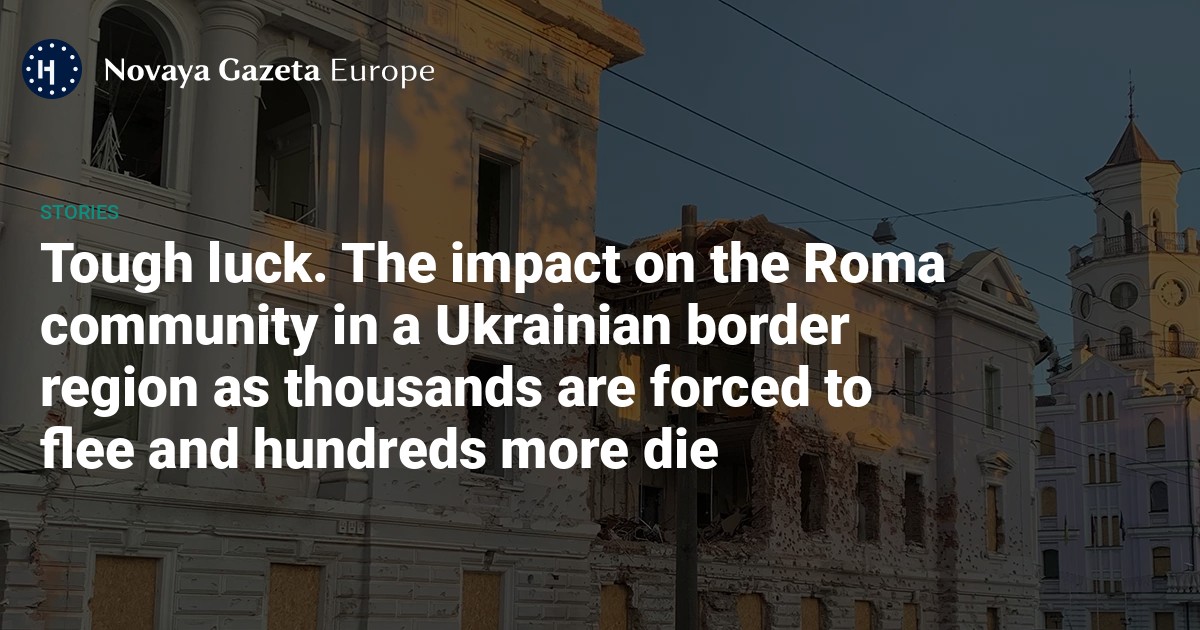
The Sumy region in northeastern Ukraine is threatening to become the next arena of Russia’s war of aggression. The region’s governor, Oleh Hryhorov, said last month that 53,000 people had been evacuated from 202 settlements in the border area — more than 60% of the population. Waves of evacuees are fleeing the area in increasingly large numbers, as Russia flies drones indiscriminately into civilians’ homes.
Among those being displaced are the roughly 4,000 Roma living in the region. The conflict has forced them to give up their nomadic way of life, which has historically transcended boundaries between Russia and Ukraine.
In the early hours of 17 May, a Russian kamikaze drone attacked a bus on its way to Sumy. The driver had been making a trip once a day, ferrying locals back and forth to the city. Russian state media claimed falsely that the bus had been carrying Ukrainian servicemen. Nine passengers were killed.
Husakova’s face was covered in cracked scabs. Her tears burned when they slid down her wounds.
“We’d just passed the Bilopillya checkpoint when the drone struck. We didn’t hear it coming. If we had, we might have had time to get out of the way,” said Ryta Husakova, a 37-year-old Roma woman who was on the bus that day.
When I visited her at the hospital, Husakova’s face was covered in cracked scabs. Her tears burned when they slid down her wounds.
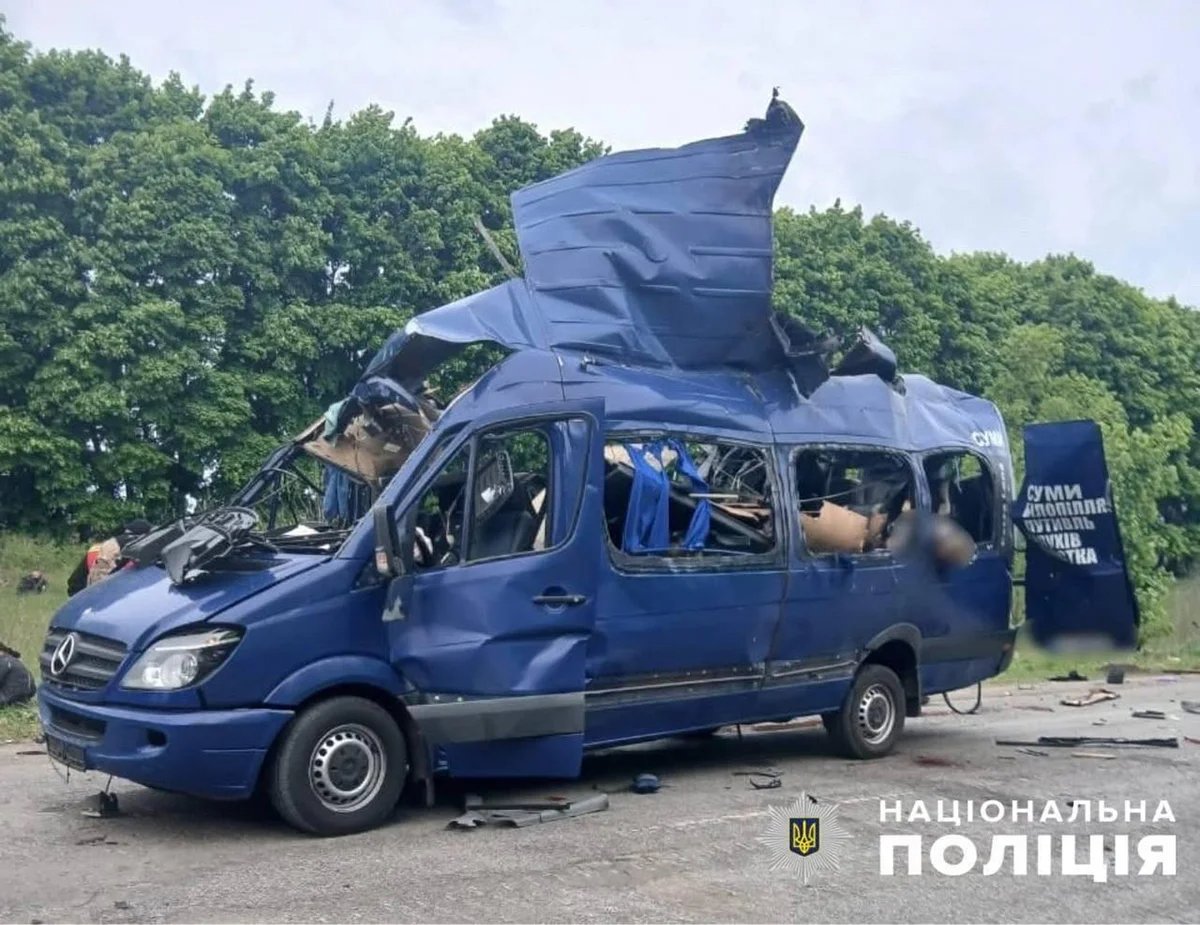
The minibus attacked by a Russian drone, Sumy region. Photo: Ukrainian police
Husakova is a mother of eight children, and her youngest is still an infant. She was heading to the city that day to apply for child benefits. The children had stayed at home in Bilopillya.
“When I opened my eyes, my mother was lying next to me. I said ‘Mum, get up!’ But she didn’t answer. I turned to the other side, and there was my younger sister, Tanya, who’s 20. ‘Sister, get up!’ My uncle was there too... all covered in blood,” Husakova said.
That she had survived a direct hit by a drone was a miracle. But when I asked her if the doctor had given Husakova permission to leave the hospital, she scoffed.
It was dinner time and a woman named Olha Mykhaylenko was laying out ham and sausage to complement Husakova’s hospital borscht. Mykhaylenko is the head of the NGO Roma Women’s Congress “Manusha” — which means “human” in Romani — advocating for educational and professional opportunities for women.
“Don’t cry. They can’t be brought back,” Mykhaylenko said to Husakova, switching in and out of Romani as she spoke. “Tell the journalist how you got from hospital to the funeral in Bilopillya.”
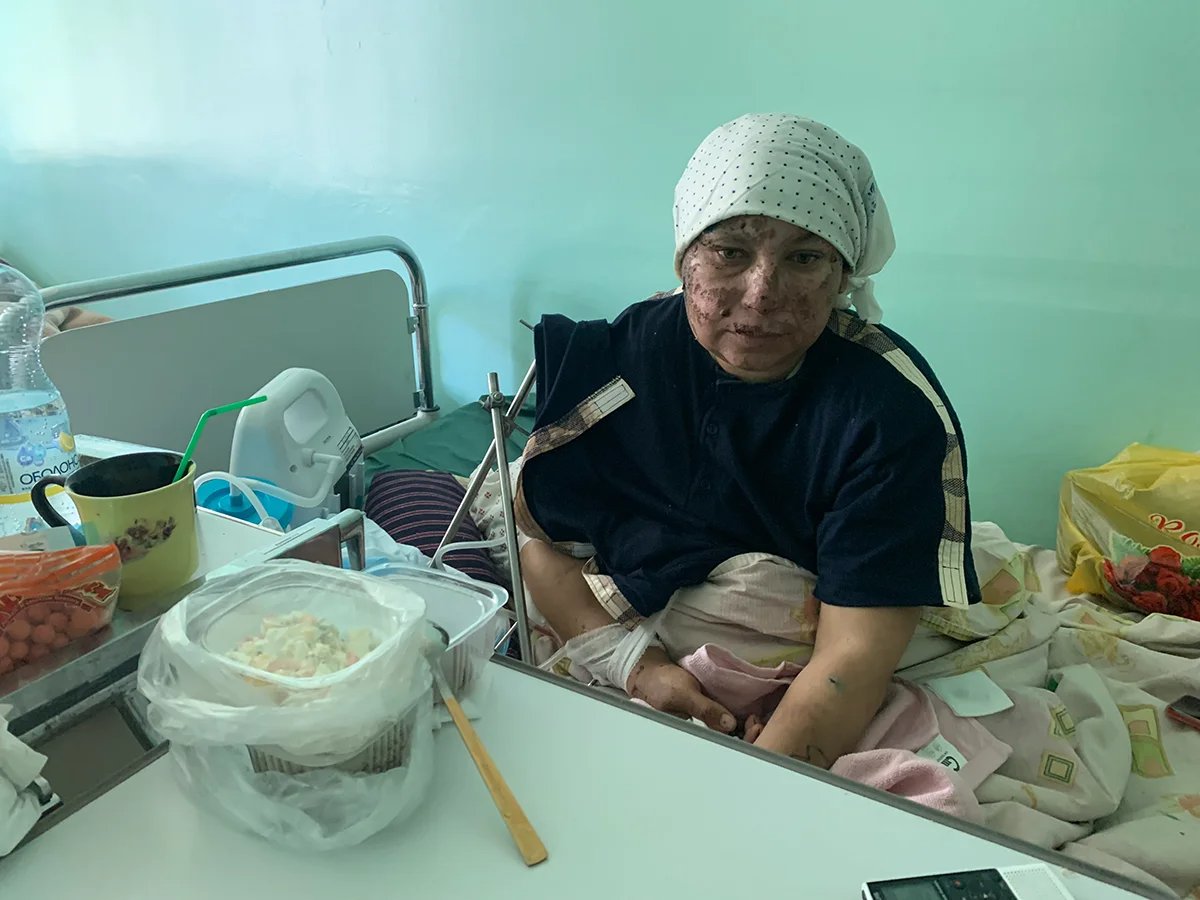
Ryta Husakova survived the impact of the Russian drone. Photo: Olga Musafirova
Half an hour before, Husakova had needed help to sit up in bed. That she had survived a direct hit by a drone was a miracle. But when I asked her if the doctor had given Husakova permission to leave the hospital, she scoffed.
“Do you think I’m going to miss my mother’s funeral? They got me into a wheelchair, so I went,” she said. “My husband came too because he has a good commander. He found out what had happened to me and immediately gave my husband leave.”
Husakova’s family won’t return to Bilopillya. Their evacuation is final.
Immediately after the attack, Husakova’s children were sent to the regional paediatric hospital. But the day I arrived in Sumy, they were being transferred to a centre for internally displaced persons run by an international charity. Husakova’s family won’t return to Bilopillya. Their evacuation is final.
When it was time for Mykhaylenko to say goodbye, she wished Husakova luck in Romani: “Aven baxtale!” “Aven baxtale!” Husakova replied.
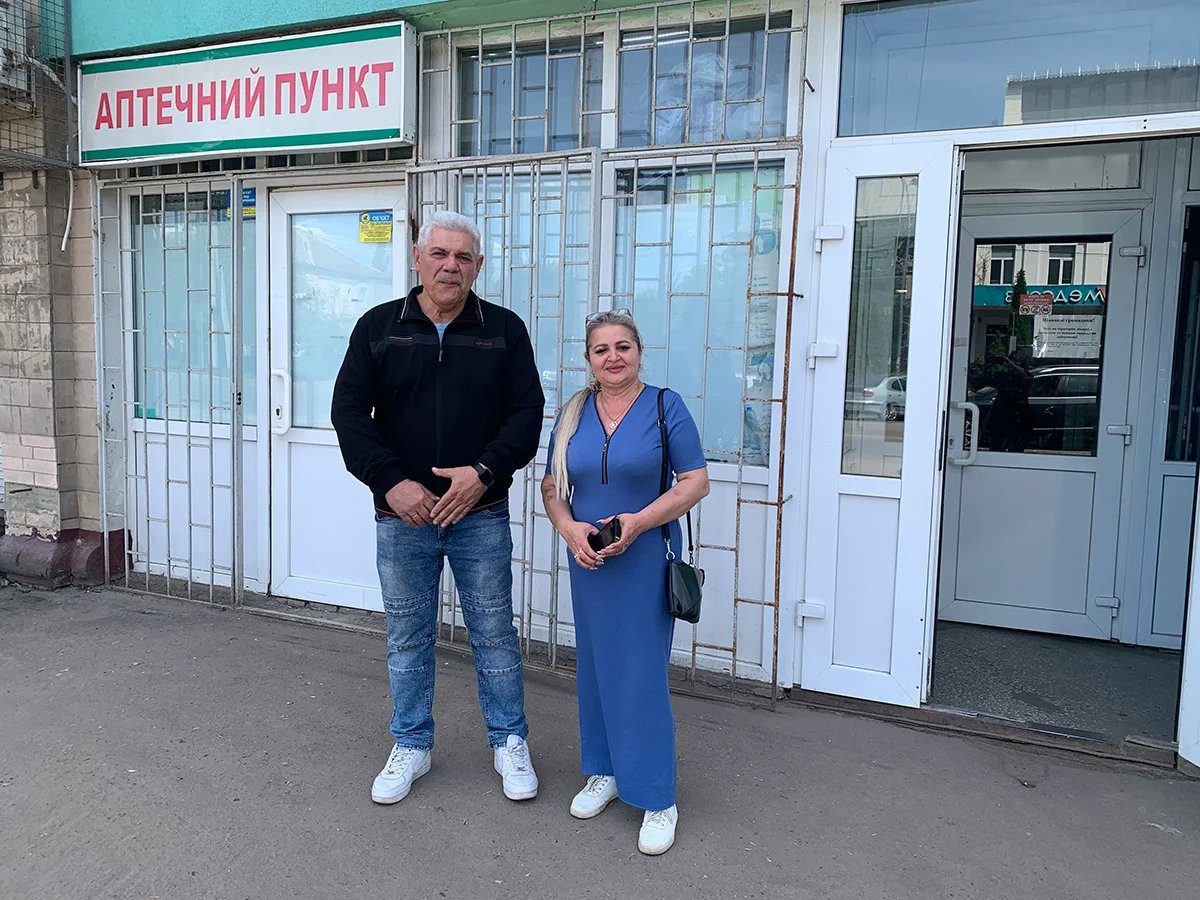
Mykola Moskalyov and Olha Mykhaylenko defend the rights of the Roma community in the region. Photo: Olga Musafirova
Sandbags ringed the front of the shelter where Husakova’s children lived. Outside, a sign said “No Guns”.
The shelter had diapers and baby food. Husakova’s children stayed in a room of their own with bunk beds by the walls and a bed with white sheets and pillows in the centre, which doubled as a play area. Zaryna, Husakova’s eldest daughter, took care of the younger children. I never saw her let her smartphone leave her hands — it had been a gift given to her by volunteers.
Bilopillya, a bustling town of more than 15,000 people in 2022, has only about 1,500 residents now.
“Which grade are you in?” I asked Husakova’s 12-year-old daughter, Kamila. “I can’t remember,” Kamila said. She hadn’t been to a school since before the war.
Bilopillya, a bustling town of more than 15,000 people in 2022, has only about 1,500 residents now. On his Facebook page, the mayor of Bilopillya, Yury Zarko, posted a photo of what remains of the school that Kamila attended. Local historians recalled that the artist Kazimir Malevich, the Ukrainian symbolist poet Oleksandr Oles and the educational theorist Anton Makarenko had all studied here.
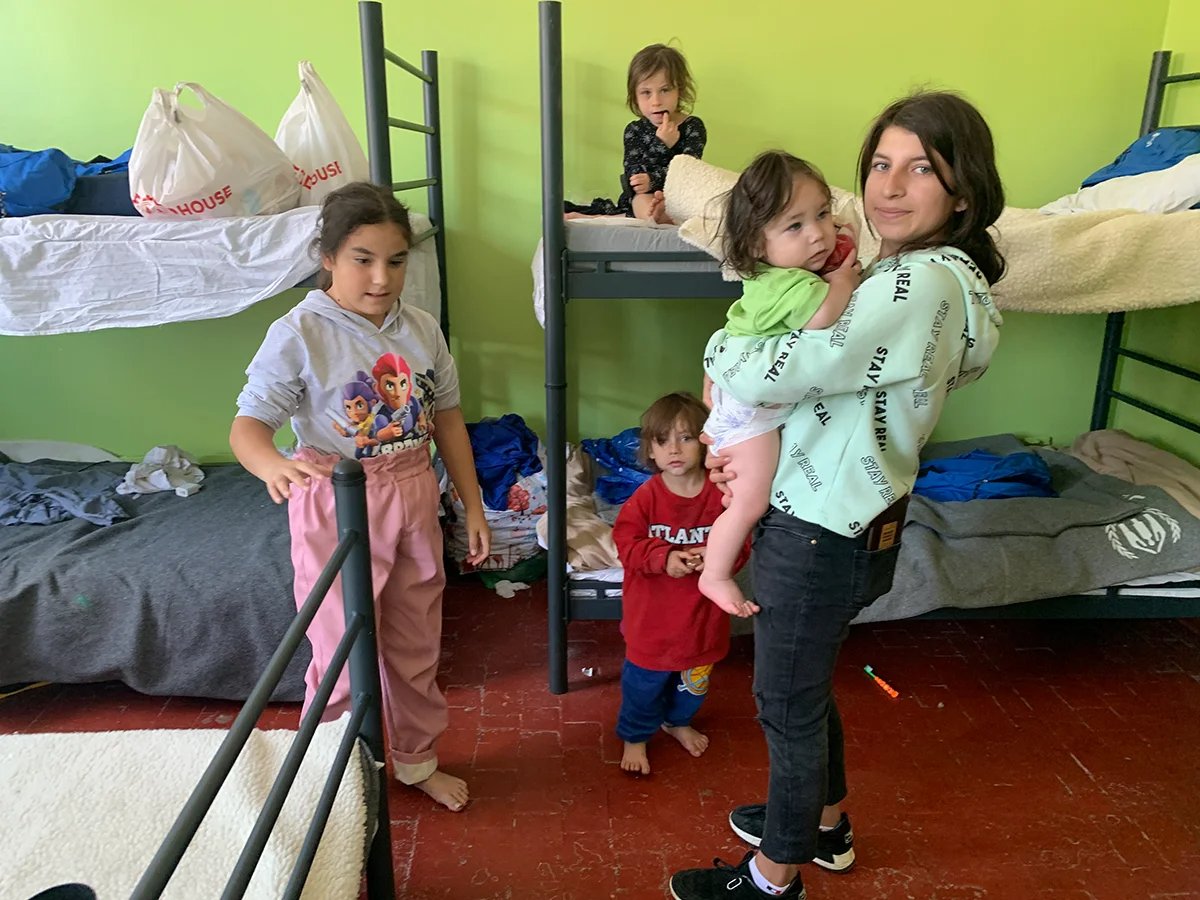
Ryta Husakova’s children in a shelter after evacuating from Bilopillya. Photo: Olga Musafirova
Husakova’s husband, Ivan Rud, is a short, skinny man who looks young in his camouflage. Grey stubble dots his face. “I worked on a tractor before the war,” he said. “Now I’m a soldier near Zaporizhzhia. Maybe I’ll be demobilised because of what’s happening.”
Rud is significantly older than Husakova. Lawyers are helping him to establish his paternity of their children, because they have never done the paperwork before, so as far as Ukrainian military enlistment offices are concerned, Rud is a childless bachelor.
When Trostyanets was liberated by the Ukrainians in March 2022, the first thing Shulha did was give him a proper burial in her garden.
Meanwhile, Husakova’s relatives had come to help take care of the family, including Zobar, the husband of Husakova’s younger sister who died in the minibus. Zobar’s mother has come from Zakarpattia, more than 1,000 kilometres away on the other side of the country, to babysit Husakova’s two youngest children.
Husakova’s family was being supported by their Roma community too. While the children were unable to attend school, Mykola Moskalyov, the head of the Roma National Association of the Sumy region, who just also happens to be Mykhaylenko’s husband, had promised to find and pay for a nanny-tutor to help them.
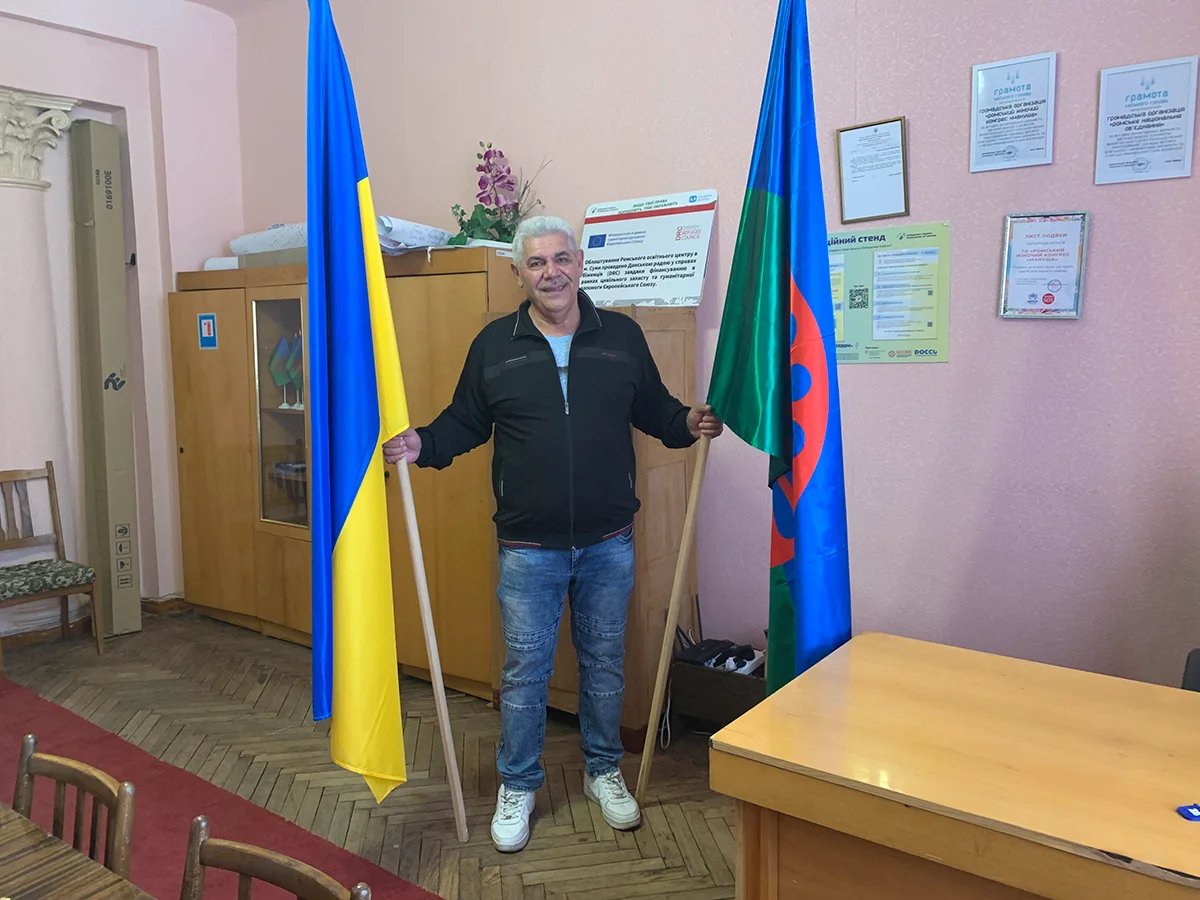
Mykola Moskalyov at the National Roma Association office, with Ukrainian and Romani flags. Photo: Olga Musafirova
Moskalyov had told me that he had spoken with Roma throughout the region who, in the early days of the full-scale invasion, had experienced the brutality of Russian soldiers under occupation. Kateryna Shulha, an elderly Roma woman, had lived in the Sumy region town of Trostyanets with her son and grandchildren. When the Russians occupied Trostyanets, the family was held hostage in the cellar under the house. Russian soldiers occasionally let Shulha out to get bread but refused to allow her to buy medication for her diabetic son. He died in the cellar. The soldiers didn’t allow the family to take the body out to be buried so she buried her son right there.
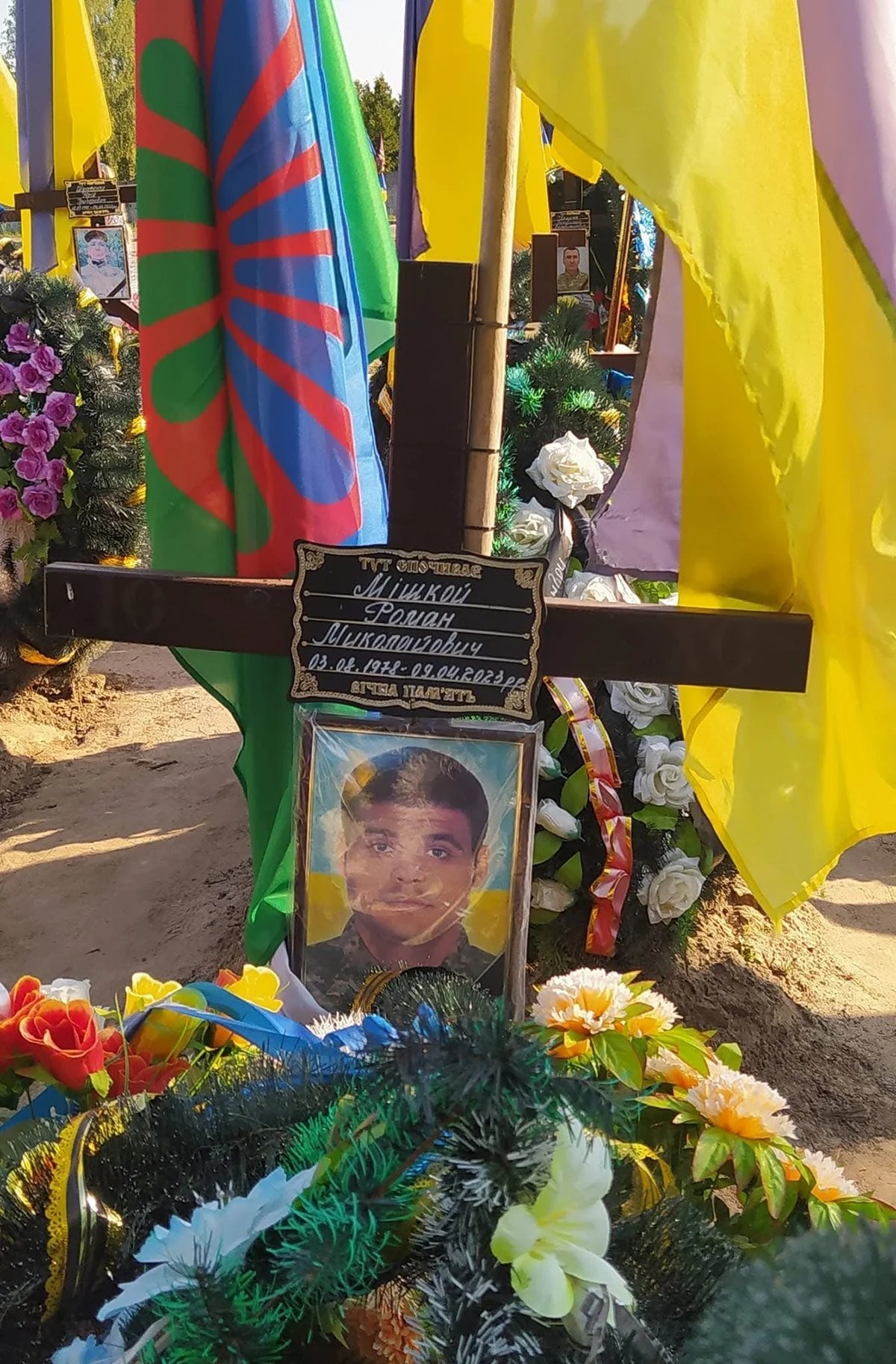
Two flags, Ukrainian and Roma, are placed on the graves of fallen Roma soldiers. Photo: Olga Musafirova
In the video of Shulha’s story, which was posted on Facebook, Shulha said that after her son’s death she kept imagining that “the earth was moving”, that her son had been buried alive and wanted to dig him up. When Trostyanets was liberated by the Ukrainians in March 2022, the first thing Shulha did was give him a proper burial in her garden. The town cemetery had been mined by the Russians.
Moskalyov didn’t know how many Roma men from the Sumy region had been enlisted to defend Ukraine on the front line, because many soldiers do not publicly disclose their ethnicity. But the gravesites of the Roma servicemen who died defending Ukraine now display both the Ukrainian flag and the blue-green Roma flag.
The Russian government has banned independent media. We were forced to leave our country in order to keep doing our job, telling our readers about what is going on Russia, Ukraine and Europe.
We will continue fighting against warfare and dictatorship. We believe that freedom of speech is the most efficient antidote against tyranny. Support us financially to help us fight for peace and freedom.
By clicking the Support button, you agree to the processing of your personal data.
To cancel a regular donation, please write to [email protected]
VPNovaya
Help Russians and Belarusians Access the Truth
